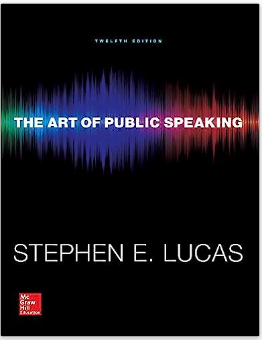“Public speaking is a skill that you can learn. It’s like riding a bicycle or typing. If you are willing to work at it, you can rapidly improve the quality of every part of your life.”
The art of public speaking is essential in our lives like education, business, public gathering, and stage. We all have the need to share our thoughts in front of an audience at times during our lives. Whether we’re speaking at our sister’s wedding, communicating with our team, teaching a course, or speaking in the public arena, we all want to deliver a speech well. So, why quit the chance to learn?
In this article, we’ll define to alleviate some of your anxiety about speaking in front of a large audience. we’ll also cover the importance of public speaking skills, how to boost confidence and the module on the great speech.
Table of Contents
- What is the art of public speaking and why it is more important?
- Why do we have anxiety about public speaking?
- How to deal with fear?
- 8 tips to immediately improve your art of public speaking
- 1. Identify your audience
- 2. Research your topic in detail and practice
- 3. Know your speaking style
- 4. Believe in your content and build trust by sharing your personal experience
- 5. Walk the full stage and give attention to the whole viewer
- 6. Fix your Body language
- 7. Outfit to impress
- 8. Respect the audience’s time
- 5 Best Books for The Art of Public Speaking
What is the art of public speaking and why it is more important?
Public speaking is a presentation delivered by you to the public, The “public” can vary from a very small group of people to a large audience. For many people, a big audience creates more fear but, some people are as scared of presenting to a small group. It can cover many different types of topics.
The main motive of speech may be to educate, entertain, and influence the audience, we can use an electronic slideshow to supplement the speech.
The spoken word is more powerful than the written word of the influenced speaker. All the time, the art of public speaking has played a crucial role in government, business, and education. It involves using various techniques and skills to engage and captivate the audience, convey information clearly, and persuade or influence them to take a desired action or adopt a particular viewpoint.
Words have the power to educate, persuade, inform, and even entertain. Whether you are, a small business owner, employee, or student. You will benefit from public speaking skills.
Read more: 125 Powerful Affirmations for Public Speaking: Win the Room
Why do we have anxiety about public speaking?

Almost 77% of the population have some kind of fear adjoining public speaking. It is important to find the reason why you feel anxious. Some main reasons are here:-
- You feel awkward in front of an audience because you’re in doubt about how you’re judged by others.
- A large audience provokes your nervous system, which can cause fast breathing, disturbance, and an increased heart rate.
- When you compare yourself to influenced speakers, whether they’re professionals or your friends.
- If you’ve had a bad experience with public speaking before, you carry this feeling and mindset with you.
- Maybe, you haven’t learned the proper skills. In this case, your anxiety is real but also easily improvable. All you need to do is prepare wisely and learn some skills.
Read more: 120 Positive Affirmations for Career Success & Growth
How to deal with fear?
There is no secret formula that you must follow to succeed, but there are many ways to deal with fear and deliver a great presentation.
- The art of Public speaking isn’t scarier than you think. At least not for you, you must have to tackle your fears.
- Practice in a safe place. Like with family, and friends, or in a group public speaking.
- The more you practice it, the more confidence you gain in yourself.
- Try to learn the perfect points for public speaking. Then you’ll become motivated, and you’ll carry on when things get tough.
- Confidence gets through rehearsing. That means you’ll have to begin practicing. Also, be careful that you may appear confident to others even if you don’t feel it on the inside.
Here are, 8 tips to immediately improve your art of public speaking

You can also take this course:
THE ULTIMATE GUIDE TO PUBLIC SPEAKING CONFIDENCE
A Proven System To Overcome Stage Fright and Absolutely Crush It Whenever You Have To Speak or Present In Public, On Video, or On Social Media!
Click here
1. Identify your audience
Knowing your audience is the most important thing you can do before you even think about preparing your speech. This means knowing the statistics of the audience is imperative. Consider that age, gender, education level, income, ethnicity, and location are all factors, and deliver your message accordingly.
Make sure that the language, tone of voice, content, and body language are suitable for the audience. Now, try to understand why people are listening to you. Ask yourself, if you are in the audience, you will really interested in listening and gaining knowledge about this speech?
Think about the difference between language and tone when you talk to your closest friend and family member and when you to a potential investor or an employer.
2. Research your topic in detail and practice
You’ll talk confidently about the topic when you know a lot. Make sure you do research on it and collect information, like some facts, evidence, and images about the topic in order to make you sound knowledgeable and trustworthy but don’t exaggerate it.
More than 40% of Americans, have a fear or don’t know the art of public speaking, only practice helps you to reduce the panic and stress during your presentation. Rehearse your speech multiple times to feel comfortable with the material and to work out any kinks in your delivery. Practicing allows you to really show your main points, prepare for bad situations that may emerge during a presentation, help to overcome your fears, build confidence in your communication skills, and it can make you a great stage presenter.
Take ten minutes before your speech and just relax, breathe deeply, and make your perfect mindset.
3. Know your speaking style
Every influential speaker has a unique speaking style. Your voice is one of your most powerful tools as a speaker There are many categories of speaking styles and personalities, if you’re trying to impose a style on yourself that doesn’t match your personality, you’re putting yourself up for frustration.
For example, if you’re speaking to a group of professionals, you may want to use more technical language, while if you’re speaking to a group of students, you may want to use simple language and examples that they can relate to. Speaking too quickly or mumbling can make it difficult for your audience to understand you. Speak slowly and enunciate your words clearly to ensure that your message is heard. Use it to emphasize key points, vary your tone and pace, and project your voice to ensure that everyone in the audience can hear you. Your speaking style should be formed by a combination of personality, speech, and the type of event.
Related Post: Tone of Voice: 6 Amazing Steps to Improve It
4. Believe in your content and build trust by sharing your personal experience
Believing in what you’re saying plays a vital role, If you’re confident in your ideas, the audience is more likely to believe in them but choose your word wisely. Speak from the heart and be yourself, rather than trying to put on a persona or emulate someone else’s speaking style.
Sharing your personal experiences with the audience establishes a bond to connect with them. Say something about your personal experiences like losing your job, dating life, and college applications. This way, your viewers can easily understand your point of view.
5. Walk the full stage and give attention to the whole viewer
It’s difficult to keep the audience engaged if you’re standing in one place all the time. So, walk around and provide some visual stimulation to each portion of the audience. Don’t be afraid to step away from the stage or move closer to your audience to create a sense of connection, but avoid excessive movement. It also helps to elevate your energy level and makes you look like a more confident presenter.
6. Fix your Body language

A positive body gesture is one of the best ways to improve your stage presence. Good posture is important for extrusive confidence and authority.
Practice standing straight or sitting up erect and avoid the desire to lean against walls. This will help you look more confident and breathe better, which can also reduce nervousness. Make sure to look at different people in the audience, and maintain eye contact for a few seconds, showing that you are speaking to them directly. Keep your shoulder unbent, elongate your neck, and raise your chin up. notice your arms and hands when you’re talking to someone. Use gestures that are appropriate for your message, and avoid excessive or distracting movements.
7. Outfit to impress
People judge books by their covers. it’s a real fact of life. People will always assume you from your choice of clothing. If you’re presenting something formal and the event is management, a good dress may be the best way to perform. If you will be recorded or live-streamed, keep in mind that certain colors and patterns can look distorted on camera. Avoid small patterns and bright colors that can appear fuzzy or distorted on camera.
Before the event, try on your outfit and practice moving around in it. Make sure it is comfortable and that you feel confident wearing it. Dressing well and looking good will help you stand out and it will attract more audience’s attention when you’re speaking.
8. Respect the audience’s time
It’s important to respect your audience’s time. Start your presentation on time and complete it on time. For example, If you are given 30 minutes make sure to finish within that time frame. When you prepare your speech, focus on the most important information, and avoid adding unnecessary details that do not contribute to the overall message. Using visual prompts such as slides or graphs can help you share information more efficiently, which can save time and keep your audience engaged. You can ensure that everything runs fairly in your presentation.
When the audience assumes their time and energy are being appraised and respected, they will give you their whole attention. leave time at the end of your presentation for questions, it shows that you value your audience’s input and are open to feedback. At the end of your presentation, say thanks to your audience for their time and attention. This shows that you appreciate their presence and are respectful of their schedules.
5 Best Books for The Art of Public Speaking

Books can be important for the art of public speaking. Here are some reasons why:
It can provide you with the tools and tips you need to develop your public speaking skills. From tips on how to prepare your speech, to strategies for connecting with your audience, books can offer full of information to help you become a better speaker.
Reading and watching other great speakers and their experiences can be incredibly inspiring. Books can offer insight into how successful speakers have overcome challenges, honed their craft, and found their voice.
Reading books about the art of public speaking can help you feel more confident about your ability to speak in public. By learning from experts and gaining a deeper understanding of the art of public speaking, you can feel more comfortable and prepared when it comes time to take the stage.
Providing you with fresh ideas and inspiration for your speeches. By reading about different topics and approaches, you can expand your horizons and find new ways to connect with your audience.
(1) Book Name – The Art of Public Speaking
Author – Stephen E. Lucas

(2) Book Name – Speak to Win
Author – Brian Tracy

(3) Book Name – Develop Self-Confidence, Improve Public Speaking
Author – Dale Carnegie

(4) Book Name – Speak With No Fear
Author – Mike Acker

(5) Book Name – Ted Talks: The Official TED Guide to Public Speaking
Author – Chris Anderson

Final thoughts
I hope these tips and tricks will not only help you conquer the art of public speaking but also give you incredible presentations to perform better.
Related Posts:
1. Professional Development Plan: 7 Ways to Prosper It
2. Negotiation: 8 Simplest Ways Can Make You Successful
3. Time Management: A Trustworthy Guide and 9 Tips
4. A Life Coach: 8 Great Reasons for Hiring
5. 101 Professional Positive Affirmations for Work



